
No. 19, 2024 | 6 December 2024
Go to:
From FRSA's Executive Director
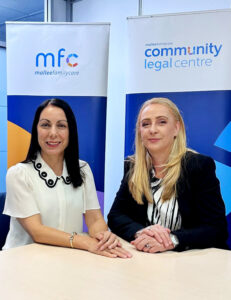
Last week, I took the opportunity to travel to Mildura for FRSA’s AGM. Whilst technology has its plusses when holding meetings for national audiences – saying goodbye to people on line who have been such an important contributor to the life and times of FRSA doesn’t feel quite right. So – with FRSA’s AGM coming up and the then Chair, Teresa Jayet stepping down from her position as Chair and as a Board Director – off I went.
It was great to be able to catch up with Teresa in her last few hours as Chair of FRSA and work alongside her for that final AGM held at midday on Thursday 28 November 2024. My sincere thanks to all FRSA members who attended that meeting. Thank you for gathering to hear directly from our Chair and Treasurer about the year that has been. As a mechanism of accountability and feedback to the membership it was great to have so many of you there. The FRSA Annual Report 2023-2024 was also released and is available on our website.
At the AGM – as Returning Officer I also returned the results of the FRSA Board election process. Those elected (through independent company Australian Election Company) were: Allison Wainwright, Leanne Strommen (re-elected Directors) and new Directors Graeme Westaway from Better Place Australia and Cheryl Lierton from Uniting Communities. Sincere thanks was also expressed at the AGM to all Board Director nominees for their interest in being part of the FRSA leadership.
Today, the first FRSA Board Meeting for the newly assembled Board was held and Office Bearer positions and Committee membership was resolved. I am pleased to share the news with you that the Board Executive and Committee/Working Group Chairs will be:
- Chair, FRSA Board – Allison Wainwright
- Deputy Chair, FRSA Board – Leanne Strommen
- Treasurer – John Bouffler
- Finance, Risk and Governance Committee – Chair, John Bouffler (Treasurer)
- Sector Events Committee – Chair, Leanne Strommen
- Research and Policy Committee – Chair, Felicity Williams
- Reconciliation Action Plan Working Group – Chair, Cheryl Orr.
Full Membership of these Board Committees is available on the FRSA website.
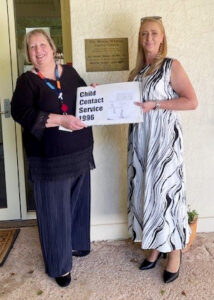
Making the most of my time in Mildura – which was also my first, I did manage to spend some time with Mallee Family Care staff learning more about their work in CfC FP and FRSP services – especially their FRC and related work and the Children’s Contact Service (CCS). You are never too old to learn something new and I did learn that the CCS site in Mildura was the first regional site of the Commonwealth funded pilot CCS program which opened its doors in 1996. Here I am with Sharen Riley, Team Leader at MFC outside that building holding a scrapbook of treasured memories from that opening. My thanks to Teresa, Jenny, Chris and Lisa-Marie and your wonderful staff (you know who you are!) for taking so much time out to spend with me whilst in town. It was certainly too good an opportunity to miss.
I also wanted to send a big thank you out to all those people who have submitted abstracts to the CIP Forum and FRSA Conference 2025 Call for Abstracts processes. We ended up with 43 abstracts for the CIP Forum and 150 for the National Conference. This was an amazing response from the FRSA network and beyond. Our reviewers have been very busy assessing abstracts and our aim is to have that process finalised and authors notified/offered a position to speak as part of their respective event by Friday 20 December 2024.
There is still plenty going on so, I encourage you to read on to find out more.
Kind regards,
Jackie Brady
FRSA Executive Director

Child Inclusive Practice 2025 - REGISTER TODAY!
Early bird registrations for the 2025 Child Inclusive Practice Forum close next week on Friday 13 December! Don’t miss the opportunity to join and learn from other specialists who work to keep the best interests of children at the forefront of Family Dispute Resolution (mediation) and child and family services.
The Forum will be held at the 59 Cameron Ave Conference and Event Centre, Canberra from 18-19 February 2025
Early Bird Registration Fees From 7 October 2024
| Registration Type | Member Rates | Non-Member Rates |
| Forum | $580 | $680 |
Speaker Registration Fees Until 13 December 2024
| Registration Type | Member Rates | Non-Member Rates |
| Forum | $500 | $600 |
Standard Registration Fees From 14 December 2024
| Registration Type | Member Rates | Non-Member Rates |
| Forum | $680 | $780 |
Targeted intervention programs for people who use violence in intimate/family relationships: FRSA Member Survey
 With the Government setting a bold ambition to end violence against Women and Children by 2032, there is a great opportunity for FRSA to provide advice to Government/s on the range of targeted intervention programs for people who use violence delivered by the FRSA Membership.
With the Government setting a bold ambition to end violence against Women and Children by 2032, there is a great opportunity for FRSA to provide advice to Government/s on the range of targeted intervention programs for people who use violence delivered by the FRSA Membership.
To build this picture we are asking FRSA Members to actively engage in this Member Survey. If you are an FRSA member and think the survey might be relevant to your organisation, please read the information sheet, which provides more detail about the survey and what we mean by targeted intervention programs and gives an opportunity to preview the survey questions. The survey will be open until 11:50PM (AEDT) Friday 20 December 2024.
FRSA Annual Report 2023-24 launched
 FRSA’s Annual Report for 2023-24 was launched at the Annual General Meeting on Thursday 28 November 2024 by FRSA Board Chair, Teresa Jayet.
FRSA’s Annual Report for 2023-24 was launched at the Annual General Meeting on Thursday 28 November 2024 by FRSA Board Chair, Teresa Jayet.
FRSA’s annual reports provide an overview of FRSA’s activities during each 12 month period (July-June). This includes program activity and evaluation, policy and advocacy, research, events and the financial report for that period.
FRSA welcomes new Board Directors
At the FRSA AGM on 28 November 2024, FRSA announced the results of the Board Election process and welcomed the newly elected Board Directors who will take up a three year appointment on the FRSA Board:
- Graeme Westaway, Executive Manager Advocacy, Digital, Communications, Better Place Australia
- Cheryl Lierton, Executive Manager, Community Services, Uniting Communities
Reelected Board Directors:
- Leanne Strommen, General Manager, Centrecare Inc
- Allison Wainwright, Chief Executive Officer, Family Life
Continuing Board Directors:
- Zoe Locke, Deputy Director, CatholicCare Social Services
- Judge Alexandra Harland, Federal Circuit and Family Court of Australia
- John Bouffler
- Felicity Williams, CEO, Upper Murray Family Care
- Cheryl Orr, Principal Solicitor, Cheryl Orr Family Law
Celebrating Six Months of Communities of Practice Success
Over the past six months, FRSA has been facilitating the third cycle of Community of Practice Sessions with program managers and senior practitioners from five programs funded under the Department of Social Service’s ‘Families and Children’ Activity—FaRS, SFVS, FMHSS, CaPS, and CfC FP.
Communities of Practice sessions have provided a dynamic and rewarding platform for eight groups to collaborate, share insights, and address critical topics in service delivery.
Communities of Practice groups have delved into key topics aimed at enhancing service delivery, including strategies to demonstrate value, tailoring interventions to individual needs, and ensuring programs remain relevant to evolving client needs. Discussions highlighted improving communication between referrers and parents, strategies to support families in navigating diagnostic challenges for children and young people and fostering community-led planning.
Sessions also explored the implications of coercive control legislation on service delivery, innovative support models for complex client needs, and exploring the potential of digital platforms like social media and gaming for therapeutic applications. Emphasis was placed on holistic intake processes, aligning with Government Strategies, and advancing evaluation methods to strengthen outcomes for vulnerable families.
These sessions have been an incredible opportunity to share knowledge, tackle challenges, and strengthen our collective capacity to support clients effectively. We look forward to building on this momentum and continuing to learn and grow together in 2025!
If you have any questions about the Community of Practice Project please contact the CoPs Project Officer, Lisa Curtis on 02 6162 1811 or projects@frsa.org.au.
The Community of Practice Project is funded by the Australian Institute of Family Studies and supported by DSS.
1 in 12 Australians experience ‘multiple deprivation’: new poverty and inequality partnership report
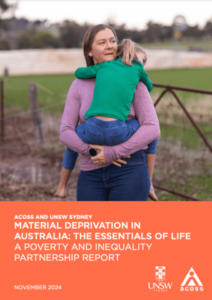 Poverty and Inequality Partnership led by ACOSS and UNSW Sydney have released a new report, which has found that people receiving JobSeeker are around five times more likely to experience multiple deprivation than the general population.
Poverty and Inequality Partnership led by ACOSS and UNSW Sydney have released a new report, which has found that people receiving JobSeeker are around five times more likely to experience multiple deprivation than the general population.
The report, Material deprivation in Australia: the essentials of life, found about one in two people relying on JobSeeker and one in three sole parents are experiencing multiple material deprivation, compared to about one in twelve people nationally.
Multiple material deprivation is when a person lacks two or more essential items because they can’t afford them. Examples include a decent and secure home, a yearly dental check-up and $500 in savings for emergencies.
The report found eight groups of people are particularly at high risk of multiple deprivation: people relying on JobSeeker Payment; Parenting Payment, Disability Support Pension or Youth Allowance, sole parent families, First Nations people, and those renting social housing or privately.
The report found:
- People on JobSeeker are around five times more likely to lack two or more essential items than the general population (45% vs 9%).
- People receiving a Parenting payment are around four times more likely to lack two or more essential items (38%).
- Sole parents (29%) and First Nations people (32%) are three times more likely to lack two or more essential items
- Private renters are twice as likely to experience ‘multiple deprivation’ compared with the general population (19%).
- People receiving JobSeeker are 14 times more likely to lack a substantial meal at least once a day; almost 9 times more likely to lack a mobile phone or a motor vehicle; and 8 times more likely to lack access to the internet at home or a washing machine
- 81% of people with incomes below the poverty line and experiencing multiple material deprivation have low wealth
- 50% of unemployed households experience multiple deprivation, lacking two or more essential items.
Appointment of new Secretary of the Department of Social Services
 Yesterday, Prime Minister Anthony Albanese announced the appointment of Michael Lye as Secretary of the Department of Social Services.
Yesterday, Prime Minister Anthony Albanese announced the appointment of Michael Lye as Secretary of the Department of Social Services.
Mr Lye has served as Deputy Secretary, Ageing and Aged Care, at the Department of Health and Aged Care since 2019, and has previously held senior positions at the Department of Social Services from 2013 to 2019.
His five year appointment will commence on 11 December 2024. The current Secretary of the Department of Social Services, Mr Ray Griggs AO CSC, will retire on 10 December 2024, having served as Secretary since 2021.
Blueprint for the National Not-for-Profit Sector released
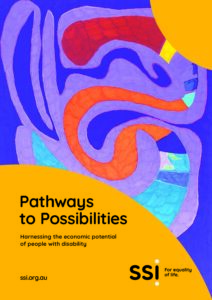 The Blueprint, developed by representatives and experts from the Not-for-Profit (NFP) Sector, sets out a 10-year vision for the future of the sector. It contains a framework, core initiatives and an implementation approach designed to ensure we have a strong and thriving sector that can continue to support Australia’s people, communities and environment.
The Blueprint, developed by representatives and experts from the Not-for-Profit (NFP) Sector, sets out a 10-year vision for the future of the sector. It contains a framework, core initiatives and an implementation approach designed to ensure we have a strong and thriving sector that can continue to support Australia’s people, communities and environment.
The Blueprint contains 18 key initiatives organised across three strategic pillars:
- Pillar One: An enabling operational and regulatory environment for the NFP sector to thrive
- Pillar Two: A people-led and purpose driven NFP Sector
- Pillar Three: An adaptive and dynamic forward-focused NFP Sector.
This Blueprint shows the important role the sector performs across Australia. The Blueprint Expert Reference Group (BERG) is now calling on the Federal Government to issue a detailed response to the Blueprint, a timeframe for implementation and funding for ongoing activities.
The Blueprint is available here.
AIFS supporting the revision of the CfC FP evidence-based requirement
The Australian Institute of Family Studies (AIFS) is working with The Department of Social Services (DSS) to support a re-shape of the evidence-based requirement that applies to Communities for Children Facilitating Partners (CfC FPs). DSS anticipates any changes to the requirement would be presented to government in the second half of 2025, with a potential implementation date of 1 July 2026. AIFS is now only assessing Promising Programs where the program is required by the CfC FP to meet the 50% requirement.
The AIFS team is happy to work with CfC FPs and their Community Partners on the underlying program documentation that would support a promising program assessment. This includes tasks like developing a program logic, theory of change, data collection planning or evaluation planning. Although the current promising program process may change post June 2026, activities in support of using evidence and evaluation in program design and delivery will still be important. Please contact AIFS if you have any questions.
Digital Technology in the Not-for-Profit Sector Report 2024
 Infoxchange has released their Digital Technology in the Not-for-Profit Sector Report for 2024. Australia and New Zealand’s largest and most comprehensive report addresses the use of technology in the for-purpose sector and the challenges that charities and not-for-profits face.
Infoxchange has released their Digital Technology in the Not-for-Profit Sector Report for 2024. Australia and New Zealand’s largest and most comprehensive report addresses the use of technology in the for-purpose sector and the challenges that charities and not-for-profits face.
The report aims to recognise areas of strength, growth and improvement by understanding how not-for-profit organisations across Australia and New Zealand use technology.
The report explores emerging and critical topics such as artificial intelligence (AI), cyber security and data systems. The report also delves into technology as an enabler of the sector’s work in facets such as remote working, digital capability, marketing and communications and much more. The report concludes with a resource section to provide further guidance to not-for-profits
on the explored topics. Read the full report.
ACNC safeguarding review
The Australian Charities and Not-for-profits Commission (ACNC) has released key findings of a review into how charities protect vulnerable people from harm.
The review focused on safeguarding, which can be defined as protecting the welfare and human rights of people that are, in some way, connected with a charity or its work – particularly people that may be at risk of abuse, neglect, or exploitation.
Best practice for safeguarding is not limited to a charity’s beneficiaries or the uses of its services; it can include a charity’s staff, volunteers, and third parties connected to the charity, such as suppliers and partners.
Key findings:
- Charities that engaged with the wider charity sector, or their specific sector (e.g., the disability sector) were able to share knowledge and resources. This reduced the individual burden on each charity.
- Strong safeguarding requires charities to take the time to establish appropriate processes, systems and procedures. The ACNC has existing resources, including templates and guidance, to help charities meet their safeguarding obligations. Smaller charities may also benefit from working with larger, more experienced charities and peak bodies.
- The charity sector acknowledges the importance of safeguarding and understands the risks of poor safeguarding. Safeguarding was often reflected in a charity’s culture but was not always documented in formal policies and procedures. This resulted in inconsistency in addressing safeguarding risks.
- Most charities were aware of their various legal obligations in relation to safeguarding. However, these obligations were rarely collected in a single place, such as a ‘legal obligations register’. This made it difficult to keep on top of changes to relevant legislation.

Family Law Amendment Bill 2024 Passed
The Family Law Amendment Bill 2024 was passed in Parliament with amendments on 28 November 2024.
This is the third tranche of family law reforms and will:
- ensure the economic impact of family violence is considered where relevant as part of dividing property and finances
- ensure the care and housing needs of children are considered in financial and property decisions
- ensure financial information is disclosed at the earliest opportunity to promote the early resolution of disputes
- expand the court’s ability to use less adversarial approaches in all types of proceedings
- establish a regulatory framework for Children’s Contact Services to ensure the provision of safe and child-focussed services for children whose families are unable to safely manage contact arrangements on their own.
The Bill and accompanying information are available here.
National Access to Justice Partnership
On 22 November 2024, the Standing Council of Attorneys-General agreed to the terms of the new $3.9 billion National Access to Justice Partnership (NAJP), which will commence on expiry of the current National Legal Assistance Partnership (NLAP) on 30 June 2025.
The new NAJP will provide:
- $558 million for Community Legal Centres and $276 million for Women’s Legal Services, a total of $833 million which is an increase of $354 million or 74% from the previous agreement
- $367 million for Family Violence Prevention and Legal Services, an increase of $193 million or 112% from the Indigenous Advancement Strategy
- $838 million for Aboriginal and Torres Strait Islander Legal Services, an increase of $326 million or 64% from the previous agreement, and
- $1.785 billion for Legal Aid Commissions, an increase of $342 million or 24%.
The Standing Council of Attorneys-General communique from their meeting on 22 November is available here.
Women and Women’s Safety Ministerial Council
The Women and Women’s Safety Ministerial Council met on 22 November to drive national progress on gender equality and gender-based violence. Ministers reaffirmed their commitment to end gender-based violence in one generation.
They discussed and agreed next steps on:
- First Nations Family Safety Plan
- The 6 September National Cabinet on Gender-based Violence Outcomes:
- National Partnership Agreement on Family, Domestic and Sexual Violence Responses
- National FDV model best-practice risk assessment framework
- Overseeing the response to the Rapid Review of Prevention Approaches.
You can read the communique here.
Missing and murdered First Nations women and children – Government response
The Australian Government has tabled its response to the Senate Legal and Constitutional Affairs References Committee report: Missing and murdered First Nations women and children.
The inquiry commenced on 4 August 2022 and the committee tabled its report in August 2024.
Of the 10 recommendations made by the committee the Government has supported one in full, supported 5 in-principle and noted 4.
Recommendation 7, which is supported in full is:
The committee recommends that the Australian government empowers First Nations women to lead the design and implementation of services and supports that address violence in their communities, as consistently advocated by the Wiyi Yani U Thangani (Women’s Voices) project, and reflecting the principles contained in the United Nations Declaration on the Rights of Indigenous People.
Information about the inquiry, including the Government’s response, is available on the committee’s inquiry page.
Report Released – National Redress Scheme
On 26 November, the Parliamentary Joint Standing Committee on the Implementation of the National Redress Scheme tabled its consensus report, following its inquiry into the operation of the National Redress Scheme.
The report, Redress: Journey to Justice, makes 29 recommendations, which focus on the accessibility, performance and effectiveness of the Scheme. This includes whether the Scheme is meeting the needs of victims and survivors who are seeking redress, whether those needs will be met before the Scheme is due to cease in 2028, and whether the Scheme fairly and accurately assesses the needs of each survivor seeking redress.
The Royal Commission into Institutional Responses to Child Sexual Abuse (Royal Commission) recommended a national scheme be established to provide redress to survivors. The National Redress Scheme began in 2018 and is due to end in 2028.
More information about the inquiry is on the committee’s website. The report is available here.

Family dispute resolution services: cost-benefit analysis report
Relationships Australia Victoria has released a cost-benefit analysis summary on their family dispute resolution (FDR) services. The report revealed that 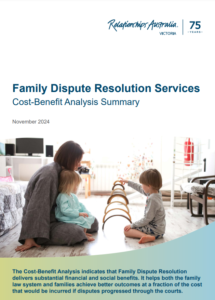 for every dollar invested in FDR, more than $20 in benefits are returned. These benefits span financial and non-financial impacts, delivering meaningful outcomes for families, the family law system and the broader community. The report recommends increasing FDR funding by 35 per cent.
for every dollar invested in FDR, more than $20 in benefits are returned. These benefits span financial and non-financial impacts, delivering meaningful outcomes for families, the family law system and the broader community. The report recommends increasing FDR funding by 35 per cent.
Family dispute resolution is a professional service designed to assist separating couples to resolve disputes about parenting arrangements, as well as property and financial matters. In Australia, separated parents must usually attempt FDR before undertaking court proceedings related to arrangements for children and parenting matters. Overall, the analysis indicates that mandatory FDR delivers substantial financial and social benefits.
Key findings
- For every dollar invested, FDR generates about $20.80 in benefits.
- The inclusion of benefits to families substantially enhances the cost-benefit ratio.
- If the non-financial benefits are excluded, the analysis still demonstrates significant returns, with a benefit of $15.3.
- The key financial benefits come from avoided costs to the family law system, estimated at $4,400 per family.
- Traditional analyses, which often focus solely on government savings, typically report a benefit range of $1.5-2.25.
- While not quantified, the report recognises that FDR likely contributes to broader positive social outcomes.
Read the full report or the summary report.
Kids Helpline gets $17.1 million funding boost from NSW Government
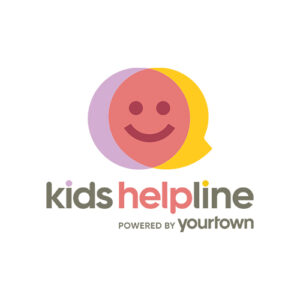 Last month the NSW Government announced it will provide a $17.1 million boost in funding for Kids Helpline to give greater access to free counselling services for children and young people facing emotional distress or mental health challenge.
Last month the NSW Government announced it will provide a $17.1 million boost in funding for Kids Helpline to give greater access to free counselling services for children and young people facing emotional distress or mental health challenge.
Kids Helpline is delivered by yourtown, who will use the funding to recruit up to 28 additional full time equivalent (FTE) counsellors based in NSW, providing greater access to the service in response to increasing demand.
The funding will also upskill counsellors with additional practical skills to help them provide better support and strengthen the integration of Kids Helpline with local, area and state-wide services across mental health, child protection, education, employment and other social systems.
Last year, the national service took more than 40,000 calls, mostly from teenagers aged 15-18.
Enrolments open for AISR’s 2025 Nationally Recognised Qualifications
 The Australian Institute of Social Relations (AISR), the training division of Relationships Australia SA, has opened enrolments for a range of qualifications in the community services sector.
The Australian Institute of Social Relations (AISR), the training division of Relationships Australia SA, has opened enrolments for a range of qualifications in the community services sector.
- Graduate Diploma of Family Dispute Resolution
- Certificate III in Community Services
- Certificate IV in Community Services
- Certificate IV Mental Health
- Certificate IV Mental Health Peer Work
Courses start in early 2025, typically taking 8 to 12 months to complete through a blend of face to face and online learning, providing flexibility to balance study with other commitments.
AISR lecturers bring their real-world experience along with a commitment to delivering high-quality education in a supportive environment, ensuring students have the skills and knowledge to excel in the community services sector.
For more information visit socialrelations.edu.au or contact AISR on 08 8245 8100 or admin@aisr.edu.au.
Youth Survey 2024 Report
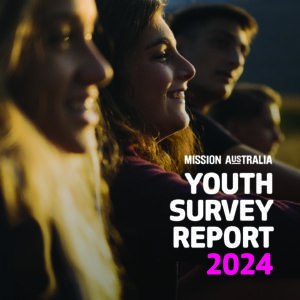 Mission Australia has released its 2024 Youth Survey Report, shedding light on the concerns and experiences of young Australians.
Mission Australia has released its 2024 Youth Survey Report, shedding light on the concerns and experiences of young Australians.
More than 17,400 young people aged 15-19 responded to Australia’s largest youth survey, revealing the top national issues were cost of living (56%); climate change and the environment (27%); violence, safety and crime (25%); and mental health (23%).
It is the first-time cost of living has featured as the number one issue, more than doubling in the last two years and overtaking last year’s leader – the environment.
Mission Australia CEO, Sharon Callister said previous leading issues of national concern such as the environment, reduced in significance when people were struggling to make ends meet amidst rising living costs.
“It is clear financial struggles are considerably impacting young lives and their views about our country,” she said.
“It points to the need for increased financial support to help alleviate financial hardship. Boosting the rates of JobSeeker, Youth Allowance and Commonwealth Rent Assistance is the best way to ensure help reaches those who need it most.” Read the full report or the state and territory reports: ACT, NSW, NT, Qld, SA, Tas, Vic, WA.

DSS Consultation – review of children, youth and parenting programs
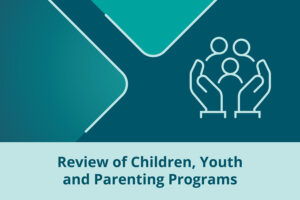 The Department of Social Services (DSS) has conducted a review of 3 children, youth and parenting programs delivered under the Families and Children (FaC) Activity. Consultation on these findings is now open.
The Department of Social Services (DSS) has conducted a review of 3 children, youth and parenting programs delivered under the Families and Children (FaC) Activity. Consultation on these findings is now open.
The programs under review included:
- Children and Parenting Support (CaPS)
- Communities for Children Facilitating Partners (CfC FP)
- Family Mental Health Support Services (FMHSS).
A Discussion Paper explores these programs’ intersection with key government actions and priorities. Submissions close on 24 January 2025. To view the Discussion Paper and Evidence Paper, or find out more about the consultation, click here.
Carer-Inclusive Workplace Initiative self-assessment tool
The initiative aims to recognise the valuable contributions of carers and create a more inclusive, supportive workplace for Australian’s who provide unpaid care in the community.
The self-assessment contains 11 questions to help determine what policies and practices already exist in your organisation. Take the self-assessment tool.
Families Australia Pulse survey
Families Australia is running a survey on NGO Sector Research Priorities & Collaborations. The team wants to hear your views on what research you’d like to see and also on how Families Australia can better assist to facilitate dialogue between the NGO and academic sectors. The survey will take about 3 minutes to complete and closes Friday 20 December 2024. If you have any questions about the survey email: policy@familiesaustralia.org.au.
THERAPLAY LEVEL 1 & MIM – Melbourne
HEY LITTLE WARRIOR – Gold Coast
A DEVELOPING BRAIN – Gold Coast
ANXIETY IN CHILDREN & TEENS – Brisbane
ACT
Family and Relationship Counsellors Various Locations | Relationships Australia Canberra and Region
VIC
Family Dispute Resolution Practitioner (FDRP) – Remote/Flexibile | Mallee Family Care
WA
Coordinator Family Law Services | Anglicare WA
NT
Financial Capability Worker | Anglicare NT
Bereavement Network Facilitator | Anglicare NT
If you have any events you’d like listed on the FRSA Events and Training Calendar or job vacancies you’d like listed on the FRSA Jobs Board, email Communications Officer, Vanessa Lam at communications@frsa.org.au. Please note that posting onto the FRSA website is reserved for FRSA Members only.

Men in focus resources | Our Watch
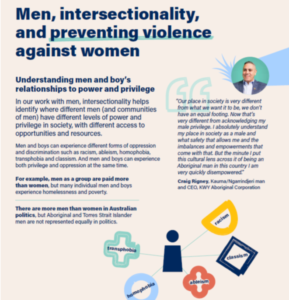 Our Watch has translated their Men in focus Evidence Review into videos, guides and infographics to support people working to engage men and boys in preventing violence against women.
Our Watch has translated their Men in focus Evidence Review into videos, guides and infographics to support people working to engage men and boys in preventing violence against women.
The evidence tells us that all men, especially those in leadership roles and positions of power, can play a significant part in the change needed to end sexism and disrespect towards women that leads to violence.
Developed through consultation with practitioners and other experts, these accessible resources support practitioners working with men and boys to prevent violence against women by building empathy, fostering self-awareness and motivation, and managing backlash and resistance.
Pathways to possibilities: harnessing the economic potential of people with disability | Settlement Services International
 This report explores the economic potential of people with disability, finding significant value to be gained by bringing them more fully into the workforce. It offers practical steps and four key commitments for employers to foster a more inclusive and equitable workplace.
This report explores the economic potential of people with disability, finding significant value to be gained by bringing them more fully into the workforce. It offers practical steps and four key commitments for employers to foster a more inclusive and equitable workplace.
In their own right: actions to improve children and young people’s safety from domestic, family and sexual violence | Australia’s National Research Organisation for Women’s Safety
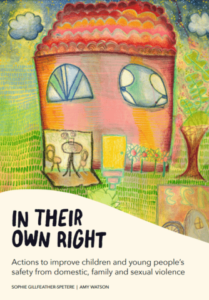 Designed for use by policymakers, practitioners and advocates, this guide synthesises research to outline key actions for consistent and effective policy responses supporting children and young people experiencing violence. It includes four principles that outline ways of working to underpin reform and eight priority areas for action.
Designed for use by policymakers, practitioners and advocates, this guide synthesises research to outline key actions for consistent and effective policy responses supporting children and young people experiencing violence. It includes four principles that outline ways of working to underpin reform and eight priority areas for action.
System review into out-of-home care | Department of Communities and Justice (NSW)
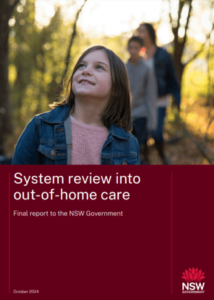 This review finds the out-of-home care system in New South Wales is not fit for purpose, failing to meet the needs of children and young people at an efficient cost. The report makes 13 recommendations to reset expectations, accountability, stewardship and service delivery across the system and calls for their urgent and immediate implementation.
This review finds the out-of-home care system in New South Wales is not fit for purpose, failing to meet the needs of children and young people at an efficient cost. The report makes 13 recommendations to reset expectations, accountability, stewardship and service delivery across the system and calls for their urgent and immediate implementation.
The national anti-racism framework | Australian Human Rights Commission
 A central reference point for a whole-of-society approach to eliminating racism in Australia, this framework will influence all levels of government and community partnerships for the next ten years. Its 63 recommendations outline legislative reform, funding, and the development of national standards and guidelines to address the root causes of systemic and structural racism.
A central reference point for a whole-of-society approach to eliminating racism in Australia, this framework will influence all levels of government and community partnerships for the next ten years. Its 63 recommendations outline legislative reform, funding, and the development of national standards and guidelines to address the root causes of systemic and structural racism.
Teenagers and safety | Commissioner for Children and Young People (SA)
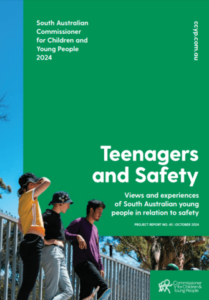 This report provides insight into South Australian teenagers’ understanding of what feeling safe means to them and where and why they feel safe. It also provides insight into where and when they do not feel safe and sheds light on the reasons why. The report calls for systemic changes that will address the underlying social drivers that relate to children and young people’s experiences of feeling unsafe.
This report provides insight into South Australian teenagers’ understanding of what feeling safe means to them and where and why they feel safe. It also provides insight into where and when they do not feel safe and sheds light on the reasons why. The report calls for systemic changes that will address the underlying social drivers that relate to children and young people’s experiences of feeling unsafe.
Australia’s gender equality scorecard: November 2024 | Workplace Gender Equality Agency
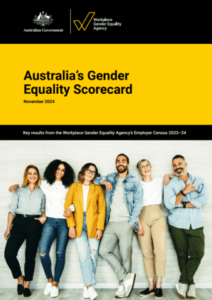 The report provides an annual update on the state of workplace gender equality in Australia. The national focus on gender equality in Australia increased throughout the reporting period. While there are still areas for improvement, this report highlights the impact of the focus and positive action on workplace gender equality in Australia.
The report provides an annual update on the state of workplace gender equality in Australia. The national focus on gender equality in Australia increased throughout the reporting period. While there are still areas for improvement, this report highlights the impact of the focus and positive action on workplace gender equality in Australia.
Online misinformation in Australia | News and Media Research Centre, Western Sydney University
 This report finds that the vast majority of adult Australians want to be able to identify misinformation and are trying to do so. However, it also finds that many adult Australians overestimate their ability to verify information online. The research findings illustrate the need for media literacy initiatives.
This report finds that the vast majority of adult Australians want to be able to identify misinformation and are trying to do so. However, it also finds that many adult Australians overestimate their ability to verify information online. The research findings illustrate the need for media literacy initiatives.
“Suiting up”: Preparing workforces to take on the mantle of preventing child maltreatment from a public health perspective | Children and Youth Services Review
Drawing on the findings from a child welfare workforce study in Australia (Russ et al., 2022), this paper considers the workforce challenges present in current neo-liberal child protection systems and looks to what is needed to engage families and communities, ‘suit up’ and equip workforces for preparing for system reform to shift the dial from risk-oriented responses to the prevention of child maltreatment across the entire community.
Experience of sexual harassment among young Australians: Who, where and how? | The Longitudinal Study of Australian Children
Over half of young Australians experienced sexual harassment in the last 12 months, when surveyed aged 16-17 years and 18-19 years. A new report from the Longitudinal Study of Australian Children found that sexual harassment is a significant social issue, and young females are most affected.
Safe from violence: An updated guide for women who are separating or leaving a relationship | Relationships Australia Victoria
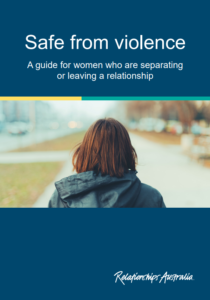 A new version of Relationship Australia Victoria’s Safe from violence booklet is now available, with updated content to meet the diverse and evolving needs of clients, victim-survivors and the wider community. The booklet includes current, practical guidance to help victim-survivors stay safe and understand their options when separating or leaving a relationship. It also covers topics including technology safety, available support services and financial assistance.
A new version of Relationship Australia Victoria’s Safe from violence booklet is now available, with updated content to meet the diverse and evolving needs of clients, victim-survivors and the wider community. The booklet includes current, practical guidance to help victim-survivors stay safe and understand their options when separating or leaving a relationship. It also covers topics including technology safety, available support services and financial assistance.
Mapping the digital gap: 2024 outcomes report | ARC Centre of Excellence for Automated Decision-Making and Society
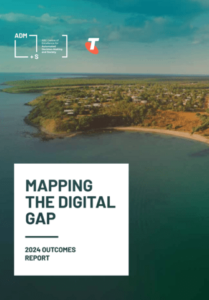 This report explores changes in digital inclusion in remote First Nations communities over several years, what may be driving change, and what further is needed to ensure those living in remote communities are digitally included. It examines progress against Closing the Gap Target 17 that by 2026, Aboriginal and Torres Strait Islander people have equal levels of digital inclusion.
This report explores changes in digital inclusion in remote First Nations communities over several years, what may be driving change, and what further is needed to ensure those living in remote communities are digitally included. It examines progress against Closing the Gap Target 17 that by 2026, Aboriginal and Torres Strait Islander people have equal levels of digital inclusion.
Want to submit something to the FRSA eBulletin?
If you have an news item or event that you would like to be featured in a future eBulletin please submit your announcement via the form below or email communications@frsa.org.au with the subject “FRSA eBulletin submission”.
Please note FRSA members receive priority for items posted in the eBulletin. And to keep information current, relevant and useful, submissions will not be repeated from week to week.
Subscribe
Subscribe to receive future eBulletin editions directly to your inbox!








